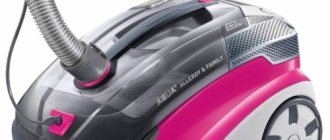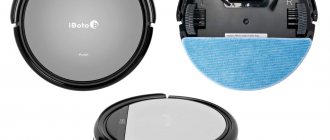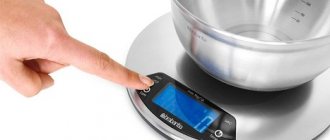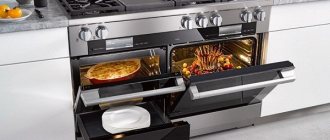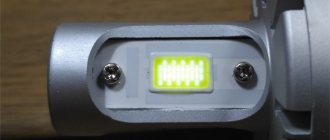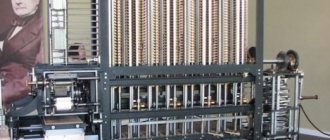Why does the vacuum cleaner make a loud noise?
Photo 1. The vacuum cleaner needs diagnostics
Just yesterday the vacuum cleaner was working fine, but then a slight noise began to appear during its operation. After some time, it already hums loudly, sometimes “like an airplane,” quite irritating the auditory receptors. Moreover, at the same time, it begins to absorb dust worse and the room smells of burning. There is no point in taking risks when working with such a device! It's time to deal with it and eliminate the cause of the noise of your vacuum cleaner before the device's motor burns out.
First of all, we clean the filters
Most often, the device is noisy due to the fact that air does not get to the motor, and therefore it is operated in overload mode. The reason for this phenomenon is trivial: the owners have not cleaned the filters for a long time and do not empty the contents of the bag in which the sucked debris is collected in a timely manner. By removing the clogged filters and emptying the garbage bag, you can easily solve the problem.
Photo 2. Variety of filters for vacuum cleaners
There are three types of filters used in household vacuum cleaners:
1. Primary – collecting debris and large dust particles that accumulate in a bag made of paper or fabric;
Photo 3. Primary filter sample
2. Nera – for collecting microparticles up to 0.3 microns in size, preventing them from getting on the device’s engine and extending its service life. They are:
- disposable, made of paper. Some people reuse them, cleaning them with a jet of compressed air. This method restores the filter by 80%. For an ideal result, it is better to replace it;
- reusable, made of polymer materials. They are washed and dried. But this does not protect them from harmful bacteria and germs.
Photo 4. Washing the reusable filter under running water
3. Aquafilter or water filter. The principle of operation is simple: dust particles are wetted, become heavier and settle inside the dust collector. The filter consists of a container for collecting large debris, dust particles and nerf. They clean it in this way: the container is washed, and the oil is washed and dried, or vacuumed and put in place.
Photo 5. Vacuum cleaner with a cyclone filter
4. Cyclone filter, which consists of a container and a filter. The dust is exposed to an air flow that picks up the smallest particles and sends them into a special transparent plastic dust collector. It must be cleaned after each use of the vacuum cleaner. Having freed the container from debris, the filter is washed, shaken out, knocked out or blown out.
Industrial and some expensive household models of vacuum cleaners have an automatic filter cleaning function. But even in them, due to active use, nera can become clogged. We already know how to clean them. From time to time the filter needs to be replaced with a new one.
Photo 6. Replacing the filter
We recommend! It is advisable to do this not in the apartment, but outside, so that dust with microbes does not again make the room dirty and harm your health.
Sometimes the vacuum cleaner not only runs loudly, but its suction power decreases. After cleaning the filter elements and replacing them, everything returns to normal.
Important! It is not unnecessary to check the suction hose and brush. Filled with scraps of paper, cellophane, and large objects, they can also cause the vacuum cleaner to hum.
Why the vacuum cleaner began to work loudly - the whole point
If the vacuum cleaner creates too much noise during operation, this is a signal for the owner. He will have to figure out the causes of the hum and find a way to fix the problem. Otherwise, the equipment will fail. In this article we will try to answer two main questions: “Why did the vacuum cleaner suddenly start working loudly?” and “What should I do to eliminate the hum?”
Reasons for loud operation of a vacuum cleaner
There are several main reasons why the vacuum cleaner becomes loud.
An overfilled dust bin is one of the most common causes, especially for older models. The dust bag can hold a certain amount of debris and must be changed periodically for disposable dust bags or cleaned (for reusable cloth bags).
An acceptable filling level is around 80% of the volume, then the filtering capacity of the bag decreases significantly, the suction power drops, and the engine begins to operate at maximum power.
Modern models of vacuum cleaners have a special light indicator that signals when the dust container is full.
Advice:
You should not reuse a disposable bag - it has low strength and a short service life. It can rupture at any time and all debris and dust will fall into the engine compartment, which can cause serious damage. Reusable bags need to be washed to improve their airflow permeability.
Clogged filters – modern vacuum cleaners have a multi-stage air purification system; premium-segment vacuum cleaners with HEPA filters are capable of capturing up to 95–99% of contaminants.
After prolonged use, the filters become clogged, so additional power is required to allow air to pass through them.
Some filters (mostly foam rubber, coarse filters) can be washed and they will almost completely restore their filtering capabilities.
Foreign objects - the traction of the vacuum cleaner may weaken due to balls of dust, large pieces of paper or debris, toys and other objects getting into the hose that will interfere with the free passage of air flow.
Technical fault – loud engine operation may be caused by worn bearings. If the filtration system is not promptly and completely cleaned, dry dust enters the engine compartment, settling on moving parts.
As a result, the coefficient of friction increases sharply; if the bearings are not lubricated in time, they begin to operate virtually “dry,” which leads to their wear. It is much worse if the problem is caused by a winding malfunction or component failure.
In this case, you will have to contact the service center.
Important:
If, when turned on, the new vacuum cleaner immediately starts to work very loudly, you must immediately contact a service center. It is highly likely that the problem is related to a manufacturing defect, so this vacuum cleaner can be exchanged.
: Why the refrigerator is loud: we study thoroughly
Why does the vacuum cleaner make a loud noise?
Photo 1. The vacuum cleaner needs diagnostics
Just yesterday the vacuum cleaner was working fine, but then a slight noise began to appear during its operation. After some time, it already hums loudly, sometimes “like an airplane,” quite irritating the auditory receptors.
Moreover, at the same time, it begins to absorb dust worse and the room smells of burning.
There is no point in taking risks when working with such a device! It's time to deal with it and eliminate the cause of the noise of your vacuum cleaner before the device's motor burns out.
First of all, we clean the filters
Most often, the device is noisy due to the fact that air does not get to the motor, and therefore it is operated in overload mode. The reason for this phenomenon is trivial: the owners have not cleaned the filters for a long time and do not empty the contents of the bag in which the sucked debris is collected in a timely manner. By removing the clogged filters and emptying the garbage bag, you can easily solve the problem.
Photo 2. Variety of filters for vacuum cleaners
There are three types of filters used in household vacuum cleaners:
1. Primary – collecting debris and large dust particles that accumulate in a bag made of paper or fabric;
Photo 3. Primary filter sample
2. Nera – for collecting microparticles up to 0.3 microns in size, preventing them from getting on the device’s engine and extending its service life. They are:
- disposable, made of paper. Some people reuse them, cleaning them with a jet of compressed air. This method restores the filter by 80%. For an ideal result, it is better to replace it;
- reusable, made of polymer materials. They are washed and dried. But this does not protect them from harmful bacteria and germs.
Photo 4. Washing the reusable filter under running water
3. Aquafilter or water filter. The principle of operation is simple: dust particles are wetted, become heavier and settle inside the dust collector. The filter consists of a container for collecting large debris, dust particles and nerf. They clean it in this way: the container is washed, and the oil is washed and dried, or vacuumed and put in place.
Photo 5. Vacuum cleaner with a cyclone filter
4. Cyclone filter, which consists of a container and a filter. The dust is exposed to an air flow that picks up the smallest particles and sends them into a special transparent plastic dust collector. It must be cleaned after each use of the vacuum cleaner. Having freed the container from debris, the filter is washed, shaken out, knocked out or blown out.
Industrial and some expensive household models of vacuum cleaners have an automatic filter cleaning function. But even in them, due to active use, nera can become clogged. We already know how to clean them. From time to time the filter needs to be replaced with a new one.
Photo 6. Replacing the filter
We recommend! It is advisable to do this not in the apartment, but outside, so that dust with microbes does not again make the room dirty and harm your health.
Sometimes the vacuum cleaner not only runs loudly, but its suction power decreases. After cleaning the filter elements and replacing them, everything returns to normal.
Important! It is not unnecessary to check the suction hose and brush. Filled with scraps of paper, cellophane, and large objects, they can also cause the vacuum cleaner to hum.
What can you do on your own?
The cause of increased noise may be the operation of an electrical appliance at full power when the filtering and dust collecting elements are clogged.
Experts recommend that before contacting a workshop, try to eliminate the causes yourself - empty the bags, clean the fine and coarse filters.
If all the manipulations depending on the owner of the equipment to clean the dust collectors and filters have been carried out, and the noise does not decrease, you should contact a service center.
We repair the engine
If you have cleaned all the filters, but the engine hums like an airplane, then most likely the problem is worn bearings. The fact is that if the filtration system is heavily contaminated, dust will enter the engine compartment and stick to the moving parts. As a result, the engine begins to run dry, after which it begins to hum or whistle.
If you detect a breakdown in time and immediately begin to fix the problem, you may get away with simply lubricating the bearings, as shown in this video:
It happens that the engine simply becomes clogged with debris, after which it begins to hum loudly. In this case, it can also be saved by simply cleaning it, as shown in this video example:
If lubrication of the bearings does not help, then the problem is in the windings or other elements of the engine. Repair in this case is most often not advisable, especially if the equipment is old. It would be much wiser to buy new equipment. You can read about how to choose a quality vacuum cleaner for your home in our article.
That's all the advice we wanted to provide. Now you know why the vacuum cleaner hums and how to repair it yourself. We remind you once again that the main cause of breakdown is clogged filters, so be responsible when servicing the device!
Like()Dislike()
: Why the vacuum cleaner has poor suction - in detail
How to prevent problems?
To prevent most breakdowns of household appliances, it is enough to follow the rules of their operation:
- regularly empty dust bags or change them (if they are disposable);
- periodically clean filters (or replace);
- Do not allow liquid to be sucked inside if the model is not designed for this.
Compliance with a number of simple rules will prevent clogging of the internal parts of the unit with dust and relieve the engine from overload. This will extend the life of the device and prevent the appearance of unpleasant symptoms - loud noise, vibration, shutdown during operation.
Our specialists know the exact answers to questions about why the vacuum cleaner does not work or how to reduce engine noise. Contacting Atlant Service is a guaranteed quick and high-quality solution to problems with home appliances of any configuration, brand or model at reasonable prices.
Let's look at user reviews
Vacuum cleaner users, mostly our dear housewives, are trying to figure out the cause of the hum and ask a lot of questions. Here are just two popular questions of the same type: “Tell me, why does the vacuum cleaner hum loudly?” and “My Samsung vacuum cleaner is noisy, what should I do?”
Photo 9. A reliable Samsung vacuum cleaner needs constant filter cleaning
It turns out that modern Samsung models have special built-in sensors that regulate motor overheating.
If the vacuum cleaner turns off during a long period of operation, it needs to rest until the engine cools down. If this rule is ignored, during further operation, it may fail.
In addition, the Samsung 1600 w model is equipped with a large number of filters that need to be cleaned periodically.
Also read our article about Samsung vacuum cleaners equipped with an Anti Tangle turbine.
After reading reviews on forums about a vacuum cleaner that began to hum loudly, users draw conclusions for themselves. Now they try to fill the dust bag only halfway, for fear of ruining the engine. Now their vacuum cleaner works silently.
Photo 10. Regular washing of filters is an unshakable rule
Conclusion
Having found out the main reasons why the vacuum cleaner began to hum, you can fix the problem yourself. However, if you are not sure of the correctness of your actions, it is better to call a specialist who will deal with the problem that has arisen and give detailed recommendations on the correct operation of the device.
| Share on social networks: |
Source: https://lightika.com/bytovaya-tehnika/pochemu-pylesos-stal-gromko-rabotat.html
Repairing the device engine
Photo 7. To inspect the engine, the vacuum cleaner must be disassembled
And now the filter has been cleaned, one of the reasons has been eliminated. We plug in the vacuum cleaner, but it still hums like an airplane, the noise level of the device is off the charts. Even an inexperienced technician will say that the problem lies in bearing wear.
If the filtration system is heavily contaminated, dust entering the engine compartment adheres to moving parts. When working “dry”, the unit begins to hum or whistle. If this is discovered in time and you begin to solve the problem, you can only get away with grease (it dries out quickly) or replacing the bearings.
Photo 8. General view of the engine of a modern vacuum cleaner
Well, if this doesn’t help, you should pay attention to the motor windings or its other elements. After unscrewing the cover with a screwdriver, you need to pull out the motor and shake the shaft with your fingers. If play is observed, everything becomes clear: the bearings, due to untimely cleaning of the filters, have become unusable.
Usually the front one fails first, on which the impeller (plastic or aluminum) depends. We disassemble the vacuum cleaner motor, remove the impeller, wash it in hot water with powder to remove adhering cement dust, dry it and put everything back together. Moreover, be extremely careful, since the impeller is crushed or even bursts from any pressure.
If this part is broken, replacing it is a mission impossible. The services do not change them; the motor comes from the manufacturer already with an impeller. A new motor will cost $30-40, and you need to look for the original - in the catalog.
We recommend! Although the Chinese equivalent motors are cheaper, it is better not to buy it. Do not forget the truth that the miser pays twice.
And if the equipment is old, purchased a long time ago, there is no point in repairing it. It makes sense to buy a new vacuum cleaner.
Why did the vacuum cleaner begin to hum loudly when working?
Modern requirements for household appliances set fairly stringent requirements for the permissible noise level. That is why, if the noise level of a working vacuum cleaner has become significantly higher, this should be a signal that it requires additional attention.
The main source of noise from a running vacuum cleaner is the engine. An increase in the volume of a running engine indicates that it is operating at increased power.
Long-term operation in this mode leads to overheating of the engine, as evidenced by an increase in the temperature of the air leaving the vacuum cleaner.
This can cause engine failure and subsequent costly repairs.
The vacuum cleaner is making a loud noise: what can you do?
If the vacuum cleaner starts making a loud noise, what can you do to avoid calling a technician? To begin, simply disconnect the hose from the vacuum cleaner. If the engine stops making noise, then a blockage has formed either in the hose or in the brush/nozzle.
You can clean the hose yourself by using a cable that plumbers use when cleaning sewers. In addition, it is necessary to clean the brush, on the bristles of which fur, hair, dust and other debris accumulate.
All this leads to the fact that the air is poorly absorbed, the thrust weakens, and it is necessary to increase the engine power.
Important:
Before carrying out work, be sure to turn off the power to the vacuum cleaner by unplugging it from the network.
If the vacuum cleaner continues to make noise, the filters need to be cleaned and replaced. In this case, it is necessary to clean the vacuum cleaner body from dust:
- The chamber in which the dust collector is located must be wiped with a damp cloth and the debris accumulated there must be removed.
- Clean all the cracks, ribs, and niches on the vacuum cleaner body where dust may accumulate.
- Inspect the place where the dust collector is attached - it should be clean; dust and sand particles will prevent the dust bag from being tightly attached. Through leaks, dust will enter the motor, causing increased wear of the bearings.
- Blow out the engine compartment by disconnecting the dust collector. In this case, the housing must be tilted in different directions, changing the suction power - this will allow you to get rid of debris and dust trapped in the engine compartment.
If after this the engine continues to make noise and does not suck up dust well, you must contact a service center.
Before using the vacuum cleaner, check that all parts are in place, the filters fit tightly and there are no gaps through which dust can enter the engine compartment. In addition, loosely installed parts due to vibration will cause additional noise and may fail over time.
Source: https://tehrevizor.ru/remont/79-melkaja-bytovaja-tehnika/pochemu-pylesos-stal-gromko-rabotat.html
Let's look at user reviews
Vacuum cleaner users, mostly our lovely housewives, are trying to figure out the cause of the hum and ask a lot of questions. Here are just two popular questions of the same type: “Tell me, why does the vacuum cleaner hum loudly?” and “My Samsung vacuum cleaner is noisy, what should I do?”
Photo 9. A reliable Samsung vacuum cleaner needs constant filter cleaning
It turns out that modern Samsung models have special built-in sensors that regulate motor overheating. If the vacuum cleaner turns off during a long period of operation, it needs to rest until the engine cools down. If this rule is ignored, during further operation, it may fail. In addition, the Samsung 1600 w model is equipped with a large number of filters that need to be cleaned periodically.
Also read our article about Samsung vacuum cleaners equipped with an Anti Tangle turbine.
After reading reviews on forums about a vacuum cleaner that began to hum loudly, users draw conclusions for themselves. Now they try to fill the dust bag only halfway, for fear of ruining the engine. Now their vacuum cleaner works silently.
Photo 10. Regular washing of filters is an unshakable rule
